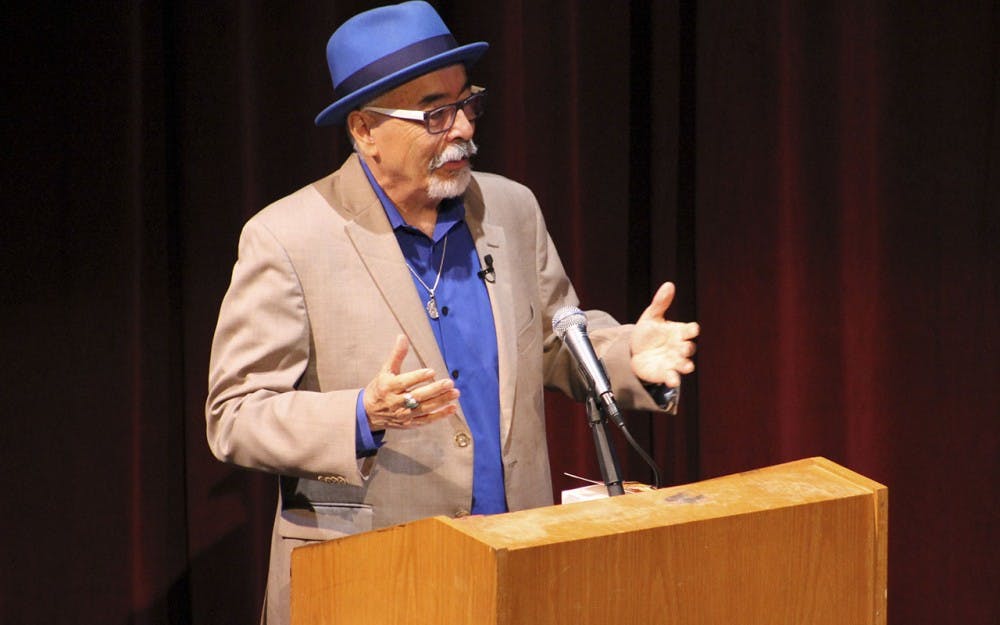United States Poet Laureate Juan Felipe Herrera discussed the experience of being a Latino in America at ¡Poesía Now!: The Power of Poetry in Our Lives at the Buskirk-Chumley Theater.
He said there is too much misinformation and not enough compassion on the topic of immigration.
“To say Mexican is to say America,” he said. “It is a difficult experience to hear this rhetoric, and that is why I write and why I speak.”
The event included a poetry reading and discussion with Herrera, who is the first Latino to be named U.S. Poet Laureate. During his visit to Bloomington, he spoke to both high school and IU students in writing workshops.
College of Arts & Humanities Director Jonathan Elmer, Provost Lauren Robel and IU assistant professor Alberto Varon gave introductions at the poetry reading.
Throughout his career, Herrera has advocated for “poetry as an instrument for political and social change through empathy, understanding and unity,” Robel said.
Varon said Herrera’s poetry is a combination of action and aesthetic.
“Taking a musical approach to the use of language, his bilingual poetry plays with the rhythms and pulses of English, Spanish and something in between them,” he said. “He dances between the material and the realm of ideas.”
Herrera’s work both represents and reanimates beliefs in the American dream, Varon said.
[COLUMN: The power of poetry | Maddy Klein - IDS]
Varon also talked about Herrara’s work as an activist. During his career as a poet, he has addressed topics like immigration and empowering Latino and minority communities.
“Building on his poetry, Mr. Hererra has for decades used his professional life to champion causes that seek to improve people’s lives,” he said. “His own history as a poet and activist adamantly insist on the beauty of the everyday of humanity, even as the connections between us are tested and reaffirmed.”
Herrera said the students he met at the workshops were full of stories and questions.
They went through a whole rainbow of experiences, Herrera said, and they spoke of topics like rape culture, the election, police violence and race.
His conversations with the students inspired him, he said. During the reading, he read a short poem from his poetry notebook that was based on a conversation he had with an IU student at one of the workshops.
“When I get back to the good old Library of Congress, I want to let them know that things are happening here,” he said.
He said he writes poetry based on what moves him at the moment. He often writes poems to respond to violent and tragic events.
His poems are about finding the biggest picture possible and writing with compassion, he said.
One of the poems he read was “Señorita X: Song for the Yellow-Robed Girl from Juárez,” which is about the murders of women and girls in Ciudad Juárez, Mexico.
“I usually don’t read that poem,” Herrera said. “I haven’t read it in a long time. It’s not an easy poem to listen to, and it’s not an easy poem to read.”
It is important to talk about things that are uncomfortable and meet issues head on, he said.
There are many opportunities available for people to express themselves through poetry, he said, and he encouraged people to continue experimenting with their words.
“Get your beautiful, magical thoughts out,” Herrera said. “Get your free expression out. There’s a lot of opportunity for you to get your word out and be your beautiful selves, like you are right now.”
Herrera engaged the audience with a call-and-response poem at the event.
The poem, called “World Unity Salsa,” was in the style of a recipe.
“We’re going to do this recipe together,” he said. “Feel free to take this recipe home and try it out immediately.”
Audience members repeated the lines spoken by Herrera, their combined voices resonating through the auditorium as the rhythm of the poem shifted.
Mary Truglia, a fourth-year graduate student in the English department, said she liked the visceral reaction from the audience as it responded to his poetry.
Reading Herrera’s work is not only about reading poetry but also listening to it, she said.
“I think it’s really beautiful,” Truglia said. “I think it’s interesting in terms of the way he plays with the assonance and the kind of vocabulary he uses, both in terms of his bilingual poems and in the ones that are just in English.”
Herrera said people can spread poetry by simply hanging out and talking about poetry.
“‘Let us gather in a flourishing way,’” said Herrera, introducing the name of his poem before he began one of his readings. He paused and gave a short comment. “I think that’s what we are doing right now.”





